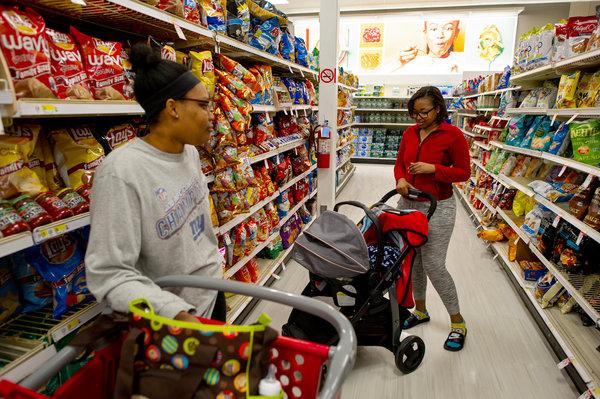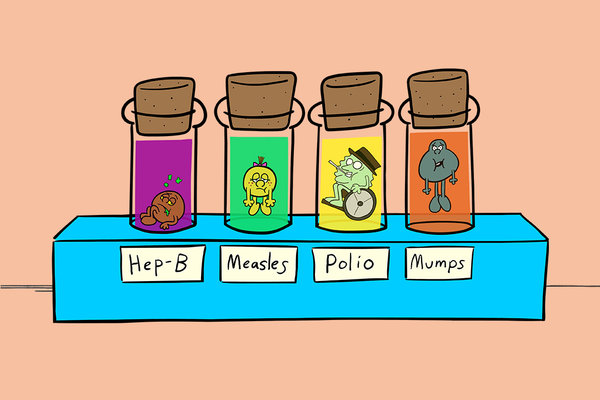[What you need to know to start the day: Get New York Today in your inbox.]
SPRING VALLEY, N.Y. — Erica Wingate was working at a clothing store in town this week when a male customer, with the black hat and sidelocks typically worn by ultra-Orthodox Jews, started coughing.
Another shopper standing next to him suddenly dropped the item she had been holding and clutched her child. “She was buying something, and she just threw it down,” Ms. Wingate recalled. “She said, ‘Let’s go, let’s go! Jews don’t have shots!’”
A measles outbreak in this suburban New York county has sickened scores of people and alarmed public health experts who fear it may be a harbinger of the growing influence of the anti-vaccine movement. But it has also intensified long-smoldering tensions between the rapidly expanding and insular ultra-Orthodox Jewish community and secular society.
The authorities here in Rockland County have traced the spread of measles to ultra-Orthodox families whose children have not been vaccinated.
And so some residents say they now wipe public bus seats and cross the street when they see ultra-Orthodox Jews. Hasidic leaders said they feared not only a rise in anti-Semitism but an invasion of their cloistered community by the authorities under the guise of public health.
On Tuesday, county officials took the extraordinary step of announcing a state of emergency, barring unvaccinated children under 18 from public places, including restaurants, shopping centers, houses of worship and schools.
“They did it to themselves,” Ms. Wingate said, referring to the Hasidic people who have refused to vaccinate. “But I feel terrible for everyone.”
The emergency order has emerged as a flash point in a continuing clash in Rockland County, a collection of five towns just northwest of New York City with a combined population of more than 300,000 people.
About 31 percent of the population is Jewish, according to the state, and includes one of the largest concentrations of ultra-Orthodox Jews in the country. The surge in the ultra-Orthodox population has been driven in part by Hasidic families from Queens and Brooklyn, where there has also been an outbreak.
Some suburbanites are concerned about the changes to their neighborhoods caused by new enclaves of high density developments intended to accommodate the often large size of Hasidic families. In some places, the influx has upended the housing market, causing some non-Orthodox buyers to seek homes elsewhere. Parents have also clashed over whether the Orthodox community has exerted disproportionate influence on public schools and siphoned funding to its yeshivas.
But while those tensions were once buffered by yeshiva walls and eruvim, the symbolic perimeters around Hasidic enclaves, the outbreak of measles, which is highly contagious, cannot be kept to such boundaries.
“I think that for the most part people have been just annoyed — in certain parts of the county you can’t buy a house or can’t sell your house,” said Jessica Finnegan, 32, who was pushing her eight-month-old son, Kieran, in his stroller through a Target store in Spring Valley. The store had been previously identified by officials as one place where people may have been exposed to measles. The outbreak of the disease began in October.

Erica Wingate, right, said she felt “terrible for everyone” involved in the measles outbreak in Rockland County.CreditGregg Vigliotti for The New York Times
She had Kieran immunized six months earlier than the recommended age, because of the outbreak, she said. “But now they are affecting us, which I think could get nasty.”
Still, Ms. Finnegan said she feared the emergency measure would spur a backlash against her Orthodox friends and neighbors. “I think this could really start something,” she said. “What if someone decided to take this into their own hands?”
Ever since the public health declaration, Aron B. Wieder, a legislator in Rockland County and a prominent member of the Hasidic community, has fielded nonstop phone calls from fellow Hasidim fearful of being vilified, he said.
“The conception that is out there is completely distorted, and that is, that the Orthodox community for the most part don’t vaccinate their children, and that is not true,” Mr. Wieder added. “The county executive had a moral obligation to point these things out.”
An unfounded fear of vaccines has spread around the world in recent years, with childhood vaccination rates reportedly declining in several countries as a result. Nothing in the belief system of Orthodox Jews makes them any more likely to oppose vaccines, and several Orthodox rabbinical organizations have called on parents to vaccinate their children. But Hasidic Jews are prey to the same misinformation that has affected others, and some ultra-Orthodox rabbis have come out against vaccines.
Mr. Wieder, who said he first learned about the order in news reports, felt that the exclusion of the Hasidim from the decision-making process was emblematic of the divisions in the county and would only sow more mistrust. “When you have people who are true haters,” he said. “They will take advantage of this type of situation and it just pours fuel on the fire.”
Steve Gold, the chairman of the Jewish Community Relations Council for the Jewish Federation of Rockland, shared Mr. Wieder’s concerns, saying the move by county officials risked exacerbating the anti-Semitism that already existed in the area before the measles crisis. He pointed to a number of anti-Semitic episodes, including swastikas spray-painted on trees.
“I think it just opened up the door for everybody to say whatever they wanted to say,” Mr. Gold said. “And they’re putting, the way it looks right now, 100 percent blame on the Orthodox community.”
The anxiety over the outbreak has spread from the aisles at the kosher supermarkets where women in head-coverings pushed shopping carts laden with babies and goods for the coming Passover holiday, to the ritual bathhouses or mikvahs. In children’s clothing shops, mothers buying Sabbath finery traded stories about friends with sickened children.
Near a strip mall that sold religious candelabra and fur hats, a group of teenage boys tugged at the prayer threads that hung at their waists, discussing whether they would hang out with unvaccinated friends.
Robin Goldstein, a Hasidic mother and a social worker, said that some in the community viewed the county orders as governmental overreach into their decisions not to vaccinate, which has left them no choice but to comply.
“They have had children not be accepted to schools, they feel that their back is up against a wall,” she said. “Some are reluctant to do it, and some of them are very angry that they are being forced to do it.”
The first cases of measles in Rockland County were contracted by people who had traveled to Israel, according to health officials. Then, in November, the county instituted “exclusion orders” that barred unvaccinated children from attending schools with low vaccination rates. At one point in December, 60 schools, many of which were in ultra-Orthodox communities, were affected by those orders, officials said, resulting in 6,000 students being kept out of school.
News of the emergency declaration was met with relief, especially from parents of babies too young to be vaccinated and older people unsure if their vaccinations from long ago were still effective. But it also sowed confusion.
At the Rockland Kosher Supermarket in Monsey, the manager, Maier Fried, stood in the aisle of Passover goods puffing anxiously on a vape pen a day after the declaration. He welcomed the order — a friend’s child has not been able to go to school since the outbreak because of a compromised immune system, he said — but was not sure what to do about the ban and feared appearing to target clients.
“How am I supposed to know who has a vaccine?” he said. “Do I ask? Do I have a right to enforce it? And am I allowed to?”
John G. Lyon, a spokesman for Rockland County, said there would not be any active enforcement of the emergency rule. “There won’t be police officers on the corner standing outside of grocery stores,” Mr. Lyon said. “Nobody’s going to ask anyone to see their vaccination records or medical history.”
Instead, he said, the order was intended as an incentive for people both to vaccinate their children and to cooperate with the health department’s efforts to trace and contain the outbreak.
But, Mr. Lyon added, if health officials tracing a new measles case discovered that unvaccinated minors had contracted or spread the measles because they went to a public place, their parents could face penalties.
More than 17,000 doses of the measles-mumps-rubella vaccine have been administered in the county in the past 26 weeks, and the county’s public health campaign included doctors as well as rabbis exhorting the importance of immunization. But the outbreak has persisted. As of Friday, there had been 157 confirmed cases of measles in the county since October.
The measure aimed at unvaccinated minors was a last resort, according to medical experts.
The anti-vaccine movement is rooted in a belief that the inoculations are linked to autism, a claim that is not medically substantiated.
Fueling the misinformation is a network of information hotlines targeting the Jewish community and claiming to tell the “truth about vaccines,” according to a recording on one. While some people can research vaccines on websites like WebMD, many ultrareligious or Haredi Jews disallow using the internet fearing overexposure to the secular world.
So members of the community must rely on the chat lines to share information.
A group called Parents Educating and Advocating for Children’s Health, or Peach, has also released an anti-vaccination handbook directed at Hasidic Jews. Its authors are anonymous. “Many of us have suffered abuse from fellow community members for questioning the medical authorities,” reads an unsigned letter in the pamphlet purporting to be from its founder.
Fault lines have appeared within the Orthodox community as well, where its leadership has been struggling not only to push those who fail to immunize their children to get vaccinations, but against the false perception that Hasidim as a whole are against vaccination.
“You have fanatics in every group,” said Avi Kagan, an accountant who is Hasidic, and who like others stressed that there is no religious edict against vaccination.
In fact, he feels his faith demands the opposite:
“The only way to serve God,’’ Mr. Kagan said, “is to be alive.”

Tyler Pager contributed reporting.

